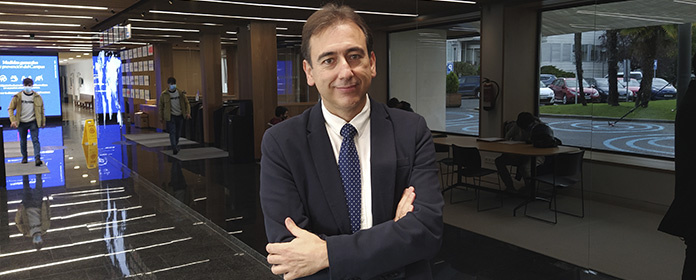Research at Education now?
Nicolás Serrano, professor at the School of Engineering of the University of Navarre.

It is common these days to see news about Education in the media. They are news about safety in schools, the way of teaching class, the necessary and available human and technical resources and others related to the current pandemic. Therefore, it may come as a surprise at this time to talk about research at innovation in education.
We are aware that status has forced us to do so and any professional in the field educational is doing things that they did not think they would do a few months ago. But even so, it can be difficult to dedicate oneself to research in innovation professor at times when so many resources are needed to carry out daily activities.
I am fortunate to belong to a group of research in which for some years we have been working precisely on innovation in education and how new methodologies and technologies are applied to this field. We have collaborated with teachers from different schools of teaching Primary, Secondary and high school diploma and, together with the experiences of colleagues from the university, it can be seen that the desire for innovation of all educators is a reality.
There is no doubt that the confinement has confirmed the importance of presence, which is what usually happens to us when we suddenly lack something we usually have at our disposal, but it has also led to the urgent adoption of these innovations. And it is no coincidence that the methodologies that were already being studied before the health alert occurred are the same ones we are applying now. Perhaps the best known is the inverted class or flipped learning, a pedagogical model that is based on inverting the usual order of activities, so that students work beforehand and outside classroom on the contents that they then deepen with professor at class.
When teaching online was the only solution and we adopted elements of the "invertedclass " I would say that we found two things: first, that presence is irreplaceable. And the second thing we realized is that if the time outside classroom is used with activities focused on the initial levels of learning, such as knowing and understanding, better use is made of the time in the class itself, where the teacher and student work on the more advanced levels of learning. That is: apply, analyze, evaluate and create. This goal to make the best use of face-to-face time is the ultimate goal of flipped learning and something that allowed us to put in internship, although in an accelerated way, the confinement.
The use of video for teaching, which is common on this model, is not a current innovation. It has been used since the early days of television almost 100 years ago, and the concept of pre-lesson study has existed since the time of Gutenberg more than five centuries ago. New technologies and the diffusion of current experiences have made it possible to extend it and make it the object of contemporary study.
This has also led to questioning the role of the teacher, changing from that of "transmitter of knowledge" to other tasks that were considered less related to Education, but in which he/she plays a more important role and has a greater impact on the Education of students, such as facilitator, trainer, manager, motivator, promoter. In other words, that in which he cannot be replaced by a machine or a video.
The opinion of teachers who have used these methodologies, after the initial skepticism, is that it is the natural path and that they do not consider a return to the traditional class . The opinion of the students, even the most critical with expressions such as subject "it makes me work harder", is that on the one hand it requires more work discipline, but it allows a clearer understanding, better use of the class and a better organization of their study.
The current status has led many teachers to immerse themselves in the use of new technologies, which is fine: many of us have taken a step forward in skill digital and have been able to verify its effectiveness. But it is not enough to float to swim. The application of new techniques and methodologies cannot be based only on opinions, impressions or a specific circumstantial status . It is important to apply a scientific method to their study, which involves carrying out projects and experiments to define methodologies and techniques and measure their results. Moreover, as it is an activity that generates a large amount of data, it can be studied with artificial intelligence techniques and machine learning algorithms to classify and even predict the results of different activities and behaviors.
The Education is proposed as the solution to many of the most important problems we face as a society: the impact of automation and digital transformation, unemployment, crisis of traditional sectors, among others. For all these reasons, it seems logical and very necessary to dedicate the necessary resources to research and that it should not be based solely on the will of staff educational .
